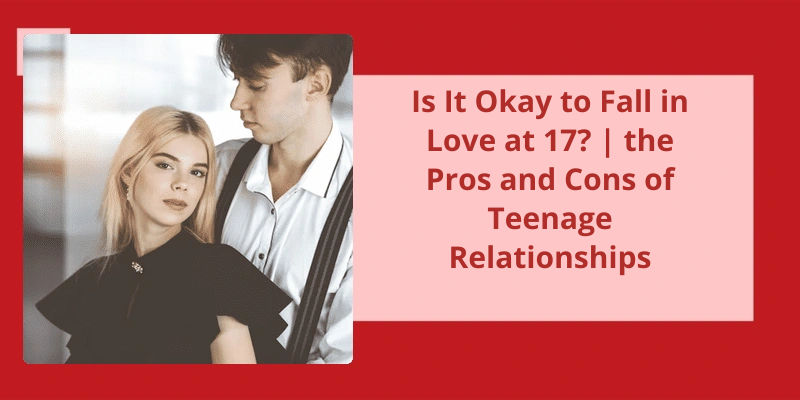The question of whether it's okay to fall in love at 17 is a tricky one, with no straightforward or definitive answer. On one hand, many teens around the world have experienced the profound feeling of love at a young age, leading them down the path of long-term commitment and even marriage. On the other hand, some argue that those who fall in love at such a young age aren’t yet ready for the emotional and psychological complexities that come with a serious relationship. However, the truth is that falling in love at any age is a natural and deeply personal experience, and there’s no one-size-fits-all answer to this question. Instead, we must examine the individual circumstances of each case and consider the unique factors that contribute to a teenager's capacity for love and emotional maturity.
At What Age True Love Happens?
Love is a complex emotion and experience that can manifest at any point in ones life. While society often romanticizes the notion of falling in love at a young age and growing up with a high school sweetheart or college partner, the reality is that everyone experiences love at their own pace. Even though over half of individuals fall in love between the ages of 15 and 18, it’s important to recognize that this statistic doesn’t mean this age range defines the ideal time to fall in love.
Cultural and societal factors can shape how individuals perceive and experience love. In some cultures, arranged marriages are common, resulting in individuals falling in love at a later point in their lives. Furthermore, individuals who prioritize personal growth or prioritize establishing their careers may find that they fall in love later in life. Theres no set rule or timeline to when love can happen, and attempting to confine it to specific age ranges can take away from the individuality and uniqueness of everyones love journey.
Additionally, it’s important to acknowledge that people experience love in different ways. Some individuals may fall deeply in love at a young age, while others may develop their feelings for another person over months or even years. Some may experience multiple loves throughout their lives, while others may only have one true love. The beauty of love is that it’s not a one-size-fits-all experience, and it can differ drastically from person to person.
True love can happen at any age, and there’s no set age range or timeline for when it should happen. While a majority of people may experience love for the first time between the ages of 15 and 18, it’s important to recognize that everyone experiences love differently. The beauty of love is that it’s individual and unique, and while societal pressures may try to confine it to certain age ranges or timelines, it’s important to remember that everyones love journey is their own.
The Psychology Behind Falling in Love at a Young Age vs. At a Later Point in Life.
This topic compares the psychological factors that influence falling in love at a young age versus falling in love later in life. It examines how life experience, personality traits, and social pressures play a role in shaping our romantic relationships.
Now that we’ve established that there’s no legal issue with a 21 year old dating a 17 year old, it’s important to understand the laws surrounding sexual relationships between minors and adults.
Is It OK for a 21 Year Old to Date a 17 Year Old?
Different states have different laws regarding the age of consent. In general, if the age of consent in your state is 18 and youre underage, it’s illegal for someone over the age of 18 to have sex with you. Even if youre only a few months away from turning 18, it’s still illegal.
But just because it’s legal doesn’t necessarily mean it’s a good idea. There can be a power imbalance in a relationship where one person is significantly older than the other. A 21 year old may be at a different place in their life than a 17 year old. The 21 year old might be finishing up college or beginning their career, while the 17 year old may still be in high school. These differences in maturity and life experience can cause problems in the relationship.
It’s also important to consider the emotional maturity of the people involved. A 17 year old may not have the emotional maturity to handle a relationship with a 21 year old. These differences can lead to misunderstandings and hurt feelings.
Parents may also have concerns about their teenager dating someone significantly older. They may worry about their child being taken advantage of or being exposed to behaviors that aren’t age appropriate. While it’s important to listen to your parents concerns, it’s also important to make your own decisions and take responsibility for your actions.
It’s up to the individuals involved to determine if their relationship is healthy and appropriate. If both people are happy and respectful of each other, and the relationship is legal, then theres nothing wrong with it. But if there are concerns about emotional maturity, power imbalances, or age differences, then it’s important to address those concerns and proceed with caution. It’s always a good idea to talk to a trusted adult or a counselor if youre unsure about a relationship.
Source: Is it weird for a 20-year-old to date a 17-year-old girl? I look …
The intensity of a relationship isn’t solely based on age, but rather the level of commitment and investment both partners have in each other. While many may question the depth of a relationship at 17, it’s important to recognize that young love can be just as significant as love found later in life. Now, let’s dive deeper into the complexities of relationships at 17 and the various factors that can impact their seriousness.
Are Relationships at 17 Serious?
While relationships at 17 may not always lead to marriage or last a lifetime, they can still hold significant weight and meaning. It’s important to remember that at any age, relationships can teach us important life lessons and help us grow as individuals. Plus, having someone to confide in and share experiences with can be incredibly valuable during the tumultuous teenage years.
That being said, it’s important for both parties to be on the same page about the level of commitment in the relationship. If one person wants a more serious, long-term relationship while the other is more interested in keeping things casual, it can lead to heartache and disappointment. Communication is key in any relationship, and being honest about your intentions and feelings can help ensure that both people are on the same page.
Theres also the issue of timing. While it’s great to have meaningful relationships at any age, there are certain challenges that come with being in a serious relationship while still in high school. Balancing school, extracurricular activities, and a relationship can be tough, and it’s important to make sure that both parties have the time and energy to devote to the relationship. Additionally, high school relationships can sometimes be affected by outside pressures from peer groups or parental expectations.
Some couples meet their soulmates at a young age and are able to make it work, despite the challenges that come with being in a serious relationship while still figuring out who you’re as a person. Ultimately, it all comes down to the individuals involved and how committed they’re to making the relationship work.
The Pros and Cons of High School Relationships
High school relationships can be exciting and memorable, but they can also have their downsides. On the one hand, relationships can provide emotional support and social status. On the other hand, they can distract from academics and personal growth, and can be full of drama and heartbreak. It’s important to weigh the pros and cons before entering into a relationship as a high school student.
These statistics shed light on the prevalence of high-school relationships and dating among teenagers. It’s clear that a sizable percentage of teenagers are involved in romantic relationships during their formative years, with many of them having already started dating before they reach 12th grade. This begs the question: what factors contribute to this trend and what impacts do these early relationships have on teenagers? Let’s explore further.
How Many 17 Year Olds Are Dating?
E. Finkel, a professor of psychology at Northwestern University.
However, these statistics may not accurately represent the actual number of 17-year-olds who’re dating. It’s important to recognize that not all teenagers are interested in dating, and some may choose to wait until they’re older to pursue romantic relationships. Some may also be limited by cultural or societal norms that discourage or prohibit dating before a certain age.
Despite this, dating is still a prevalent part of teenage life. For many teenagers, dating offers an opportunity to develop social skills and explore their own interests and preferences in potential partners. It can also be a way to build self-esteem and confidence, or simply to have fun and enjoy the companionship of another person.
When it comes to age gaps in relationships, there can be a lot of debate and opinion. However, there’s a mathematical standard to define whether an age gap is significant or not. By this standard, an age gap is only considered significant if the younger person is less than 80% of the older person’s age. So, is a 17 and 21 age gap considered significant? Let’s take a closer look.
Is 17 and 21 a Bad Age Gap?
However, age is just a number, and the maturity level of the individuals involved should also be considered. Someone who’s 21 might have a completely different life experience and outlook on life compared to someone who’s This could potentially lead to power imbalances or difficulties in communication, but it ultimately depends on the individuals involved.
Additionally, societal norms and cultural differences can also influence perceptions of age gaps. A 17 and 21 year old dating might be seen as more acceptable in some cultures or communities than others. It’s also important to consider the legal ramifications of a relationship with an age gap, as some countries or states have specific laws regarding age of consent or statutory rape.
That being said, it’s important to note that age gaps aren’t inherently problematic and can be successful in many cases. Plenty of couples have thriving relationships with significant age differences, and age shouldn’t be the sole determining factor in whether or not a relationship is viable. As with any relationship, it ultimately comes down to compatibility, communication, and mutual respect.
The Potential Challenges Faced by Couples With Significant Age Differences
- Societal stigma and judgment from family and friends
- Differences in life experiences and perspectives
- Different stages in life, such as retirement and children
- Incompatibility in energy levels and activities
- Potential health issues and caretaking responsibilities
- Fear of losing partner or being left alone due to age difference
Conclusion
But that doesn't mean you're incapable of experiencing genuine emotions, including love, at seventeen. There's no need to rush into anything, of course, and it's important to be mindful of the risks and benefits of any romantic interest. But ultimately, love is a natural human experience that transcends age and time, and there's no reason why anyone, regardless of their age, should be denied the opportunity to enjoy it. So if you find yourself falling in love at seventeen, embrace it and see where it takes you. You might just be surprised at the journey that lies ahead.






